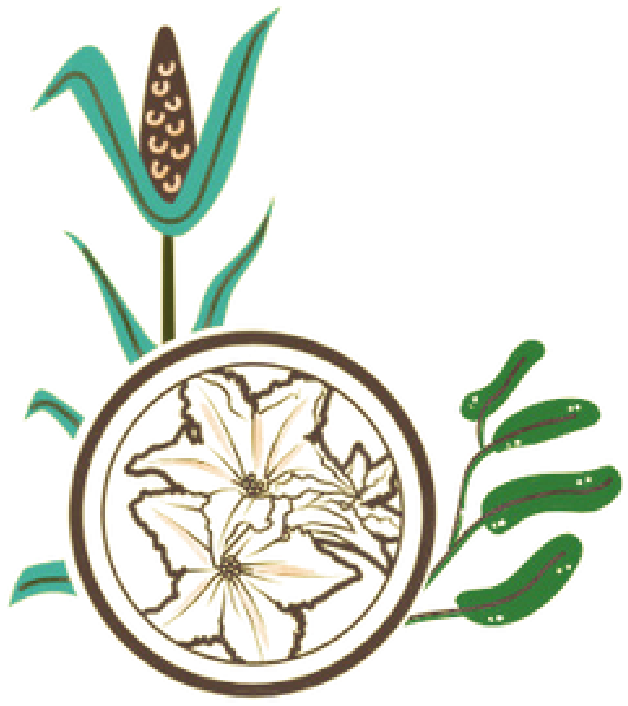Core Values of the Indigenous Futures Lab
The Indigenous Futures Lab takes inspiration for its logo and underlying community praxis from the Three Sisters' Teachings.
The Three Sisters Teachings are the lessons we learn from corn, beans, and squash. These plants flourish optimally when planted together, each playing a vital role in nurturing the others. The corn, rising as a natural pole, supports the bean vines, enabling them to climb and flourish. Beans, in return, enrich the soil by fixing nitrogen on their roots, enhancing the fertility for subsequent corn crops. Beyond this, the bean vines lend stability to the corn, safeguarding it against the winds. Meanwhile, the shallow-rooted squash vines serve as a living mulch, preventing weed growth and conserving soil moisture, thus enhancing the crops' resilience during arid periods. The spiky nature of squash acts as a deterrent to potential threats to corn and beans. This harmonious trio's interplay is not just agricultural but nutritional, with corn providing carbohydrates, beans contributing protein, and squash yielding vitamins and healthy oil.
Though Indigenous communities have been practicing and benefiting from the brilliance of companion planting for millennia, to the uncultivated eyes of early settlers, Indigenous knowledges of the land and planting practices were seen as bizarre and uninformed. As Robin Wall Kimmerer writes, "For millennia, from Mexico to Montana, women have mounded up the earth and laid these three seeds in the ground, all in the same square foot of soil. When the colonists on the Massachusetts shore first saw Indigenous gardens, they inferred that the savages did not know how to farm. To their minds, a garden meant straight rows of single species, not a three-dimensional sprawl of abundance.” Though Western science now recognizes the profound value of companion planting, this and many other forms of Indigenous wisdom has been oppressed, exploited, stolen, and mistreated throughout the history of Western academia.
At the Indigenous Futures Lab, we strive to practice a Three Sisters Praxis of entwining ourselves with already existing community projects and assisting in the future co-flourishing of us all.
Centering Indigenous Knowledge & the Land as Knower
A central goal of the Indigenous Futures Lab is to lift up, celebrate, and continue the brilliance of Indigenous knowledges. Just as the Three Sisters have much to teach us, we at the Indigenous Futures Lab recognize all of our relations as knowers who have wisdom to share with those who practice ethical listening.
Empowering Epistemic and Linguistic Sovereignty
Each of the Three Sisters is an individual with her own unique gifts and callings. From this teaching, we can glean that the sacred individuality of each creature, as well of as each epistemic community, must be honored. Or perhaps like the protective embrace provided by the large squash leaves, the Indigenous Futures Lab can serve as a caretaker and protector of Indigenous knowledges as we attempt to carve out pathways for reconnection and repatriation of Indigenous cultural and linguistic resources. By empowering epistemic and linguistic sovereignty, the lab aims to safeguard and nurture diverse gifts, much like the distinct attributes of the Three Sisters.
Honoring Pluralism and An Expansive Conception of Indigineity
Three Sisters Teachings are also pan-Indigenous in that they are powerful and recognizable symbols across Indian Country and the global Indigenous community, but they are also deeply rooted in local teachings. Specific communities have their own variations of companion planting based on the varieties of corn, beans, and squash that flourish in their of specific ancestral territories. From this teaching, the Indigenous Futures Lab models its commitment to inclusion and a broad conception of Indigeneity that is welcoming to the ancestral stewards of the land we stand on, as well as to displaced Indigenous communities, diasporic Indigenous communities, climate refugees, and other communities of color we call in as kin. We recognize that we have a responsibility to hold in loving tension the vast array of knowledge and meaning-making that exists in Indigenous ways of knowing and that respecting pluralism is part and parcel of respecting sovereignty.
Committing to Intergenerational Ethics and Sustainability
The large amount of crop residue from co-planting the Three Sisters can be incorporated back into the soil at the end of the season, to build up the organic matter and improve its structure. The Three Sisters are part of a regenerative cycle that nourishes many generations to come.
Reciprocity is a key component of intergenerational ethics that we learn from the Three Sisters Teachings. At the Indigenous Futures Lab, we see ourselves as mutual caretakers in a “covenant of reciprocity” (Whyte 2018).


